Getting started with Chickens - a series of interviews
Earlier in the year I ran a series of interviews with other bloggers who grow their own food. We all had lots of fun reading each other's responses and got some great comments from readers. The theme of the interviews was how to get started with growing your own. The first series was such a success, I thought I'd start another, this time about getting started with chickens.
Chickens are one of the easiest animals to add to your home food production system. You get eggs right away, and you can also raise them for meat if you want to. You also get the advantage of pest management and manure. Rabbits are another good option for small spaces, but not a possibility in QLD (the fine for keeping rabbits is a ridiculous $44,000).
Nearly all the bloggers that I interviewed for the first series keep chickens and agreed to be interviewed again, so over the next few weeks, I'll be publishing their responses. In the post today, I'm going to answer the interview questions myself.
How many chickens (and other fowl) do you keep, what breed and what do you use them for (meat, eggs, slug control etc)?
Depending on the time of year, we usually have 12-20 hens and 2-3 roosters and some chicks of various ages. We keep Rhode Island Reds and White Leghorns. The idea was that the RIRs are bigger birds and good for eating, and the WLs are better layers. The idea was to keep heritage breeds rather than dedicated "meat chickens" or "laying hens", that way we can continue to hatch our own chicks and keep the pullets to replace the hens and eat any roosters we didn't need for breeding. The plan is good, but we don't always get enough eggs over winter, so this autumn we bought 3 hybrid hens to supplement our egg supply. At the moment we also have 9 guinea fowl, which we are hoping will help with tick control.
Where did you get your first chickens and how do you now replenish your flock?
Our chickens came originally from people selling "show stock" and we have bred from the original chickens, as well as occasionally buying a new rooster or hen to mix up the genetics. I don't recommend buying show stock, they are usually bred to look nice rather than produce eggs. The best option is to buy from someone who is breeding for egg-laying abilities.
Fixed chicken run or movable pen? Why?
We use chicken tractors, as I explained in my guest post on Lovely Greens, and in many posts on this blog.
How do you integrate your chickens into the rest of your garden/farm?
We don't integrate as much as we could, and I think we will do more when we move to Cheslyn Rise and really design the garden to work with the chickens and visa versa (see permaculture). At the moment, we move the chicken tractors over our pasture, and we see an improvement in the fertility of the soil and the growth of the grass at the tractors move around. I think that the chickens are
What is your biggest chicken challenge at the moment?
Our biggest challenge is having hens that lay over winter. Our hens stopped laying in April and won't start again until September, this means we have nearly 5 months with hardly any eggs. This year we bought 3 hybrid hens, even though I don't really like to support hybrid chickens (or pay $16/hen when we can breed our own).
What is the best thing about keeping chickens?
Keeping chickens has multiple benefits, we enjoy the eggs (even sell the extras over summer), meat, raising the chicks, the entertainment of watching them running around the yard, bug, slug and snake control, manure production and soil fertility improvements. The best thing is knowing that we can produce our own food and chickens are an important part of that.
What is your advice to new chicken owners? What do know now that you wish you knew before you got chickens?
Chickens will get into your garden and scratch off all the mulch and destroy your seedlings at any opportunity. Fence off your garden or fence in the chickens! Chickens will also cross the road to scratch in your neighbour's garden, our neighbour was not happy with this. Best to fence in the chickens if they will be near a road.
Don't buy "show chickens" if you have no intention of showing them, try to find someone who is breeding chickens as good layers and/or meat birds. It doesn't matter what they look like, although a pure bred chicken will breed true (i.e. its offspring will have similar traits).
Next week I will have an interview with another blogger about how they got started with chickens...... Now, what do you think? Any advice for getting started with chickens?
Chickens are one of the easiest animals to add to your home food production system. You get eggs right away, and you can also raise them for meat if you want to. You also get the advantage of pest management and manure. Rabbits are another good option for small spaces, but not a possibility in QLD (the fine for keeping rabbits is a ridiculous $44,000).
Nearly all the bloggers that I interviewed for the first series keep chickens and agreed to be interviewed again, so over the next few weeks, I'll be publishing their responses. In the post today, I'm going to answer the interview questions myself.
How many chickens (and other fowl) do you keep, what breed and what do you use them for (meat, eggs, slug control etc)?
Depending on the time of year, we usually have 12-20 hens and 2-3 roosters and some chicks of various ages. We keep Rhode Island Reds and White Leghorns. The idea was that the RIRs are bigger birds and good for eating, and the WLs are better layers. The idea was to keep heritage breeds rather than dedicated "meat chickens" or "laying hens", that way we can continue to hatch our own chicks and keep the pullets to replace the hens and eat any roosters we didn't need for breeding. The plan is good, but we don't always get enough eggs over winter, so this autumn we bought 3 hybrid hens to supplement our egg supply. At the moment we also have 9 guinea fowl, which we are hoping will help with tick control.
Where did you get your first chickens and how do you now replenish your flock?
Our chickens came originally from people selling "show stock" and we have bred from the original chickens, as well as occasionally buying a new rooster or hen to mix up the genetics. I don't recommend buying show stock, they are usually bred to look nice rather than produce eggs. The best option is to buy from someone who is breeding for egg-laying abilities.
Fixed chicken run or movable pen? Why?
We use chicken tractors, as I explained in my guest post on Lovely Greens, and in many posts on this blog.
How do you integrate your chickens into the rest of your garden/farm?
We don't integrate as much as we could, and I think we will do more when we move to Cheslyn Rise and really design the garden to work with the chickens and visa versa (see permaculture). At the moment, we move the chicken tractors over our pasture, and we see an improvement in the fertility of the soil and the growth of the grass at the tractors move around. I think that the chickens are
What is your biggest chicken challenge at the moment?
Our biggest challenge is having hens that lay over winter. Our hens stopped laying in April and won't start again until September, this means we have nearly 5 months with hardly any eggs. This year we bought 3 hybrid hens, even though I don't really like to support hybrid chickens (or pay $16/hen when we can breed our own).
What is the best thing about keeping chickens?
Keeping chickens has multiple benefits, we enjoy the eggs (even sell the extras over summer), meat, raising the chicks, the entertainment of watching them running around the yard, bug, slug and snake control, manure production and soil fertility improvements. The best thing is knowing that we can produce our own food and chickens are an important part of that.
What is your advice to new chicken owners? What do know now that you wish you knew before you got chickens?
Chickens will get into your garden and scratch off all the mulch and destroy your seedlings at any opportunity. Fence off your garden or fence in the chickens! Chickens will also cross the road to scratch in your neighbour's garden, our neighbour was not happy with this. Best to fence in the chickens if they will be near a road.
Don't buy "show chickens" if you have no intention of showing them, try to find someone who is breeding chickens as good layers and/or meat birds. It doesn't matter what they look like, although a pure bred chicken will breed true (i.e. its offspring will have similar traits).
Next week I will have an interview with another blogger about how they got started with chickens...... Now, what do you think? Any advice for getting started with chickens?
By the way, my chicken eBook is now available if you want to know more about backyard chickens and using chicken tractors. More information over at the chicken tractor ebook blog. Or you can get it directly from my shop on Etsy (.pdf format), or Amazon Kindle or just send me an email eight.acres.liz {at} gmail.com.
or just send me an email eight.acres.liz {at} gmail.com.
What's the eBook about?
Chickens in a confined coop can end up living in an unpleasant dust-bowl, but allowing chickens to free-range can result in chickens getting into gardens and expose them to predators.
A movable cage or “chicken tractor” is the best of both options – the chickens are safe, have access to clean grass, fresh air and bugs. Feed costs are reduced, chickens are happier, and egg production increases.
But how do you build a chicken tractor? What aspects should be considered in designing and using a chicken tractor effectively? In this eBook I aim to explain how to make a chicken tractor work for you in your environment to meet your goals for keeping chickens.
I also list what I have learnt over 10 years of keeping chickens in tractors of various designs and sizes, from hatching chicks, through to butchering roosters.
Reviews of the Design and Use a Chicken Tractor




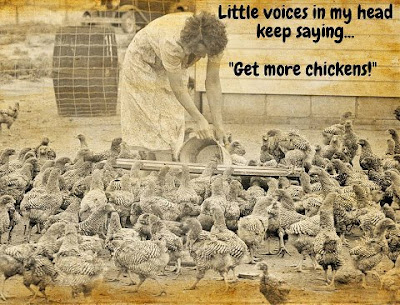













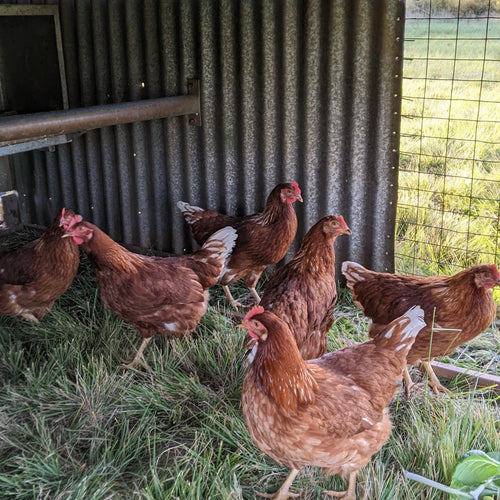
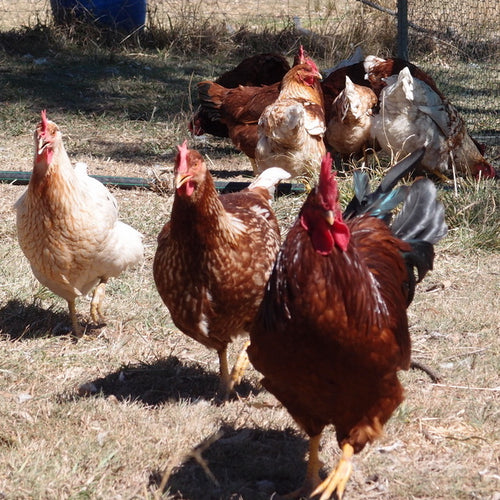
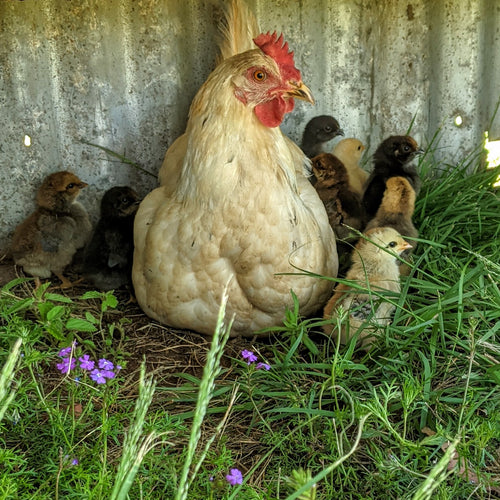
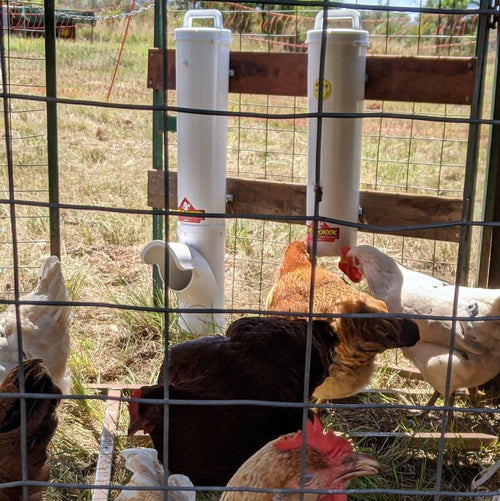



Leave a comment